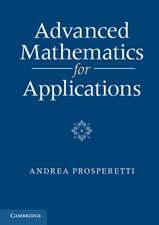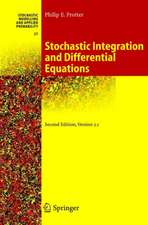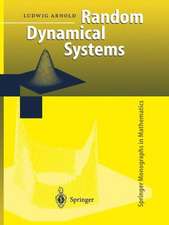Numerical Solution of Time-Dependent Advection-Diffusion-Reaction Equations: Springer Series in Computational Mathematics, cartea 33
Autor Willem Hundsdorfer, Jan G. Verweren Limba Engleză Hardback – 21 iul 2003
| Toate formatele și edițiile | Preț | Express |
|---|---|---|
| Paperback (1) | 1116.71 lei 6-8 săpt. | |
| Springer Berlin, Heidelberg – 16 dec 2010 | 1116.71 lei 6-8 săpt. | |
| Hardback (1) | 1122.87 lei 6-8 săpt. | |
| Springer Berlin, Heidelberg – 21 iul 2003 | 1122.87 lei 6-8 săpt. |
Din seria Springer Series in Computational Mathematics
- 24%
 Preț: 703.00 lei
Preț: 703.00 lei - 15%
 Preț: 497.64 lei
Preț: 497.64 lei - 18%
 Preț: 726.85 lei
Preț: 726.85 lei -
 Preț: 403.91 lei
Preț: 403.91 lei -
 Preț: 386.61 lei
Preț: 386.61 lei - 18%
 Preț: 1399.11 lei
Preț: 1399.11 lei -
 Preț: 394.51 lei
Preț: 394.51 lei - 18%
 Preț: 1395.94 lei
Preț: 1395.94 lei - 18%
 Preț: 784.48 lei
Preț: 784.48 lei - 20%
 Preț: 996.22 lei
Preț: 996.22 lei - 24%
 Preț: 635.73 lei
Preț: 635.73 lei - 15%
 Preț: 649.22 lei
Preț: 649.22 lei -
 Preț: 400.47 lei
Preț: 400.47 lei - 18%
 Preț: 740.44 lei
Preț: 740.44 lei - 15%
 Preț: 643.65 lei
Preț: 643.65 lei -
 Preț: 380.63 lei
Preț: 380.63 lei - 18%
 Preț: 904.74 lei
Preț: 904.74 lei - 18%
 Preț: 1014.28 lei
Preț: 1014.28 lei - 18%
 Preț: 1111.97 lei
Preț: 1111.97 lei -
 Preț: 393.90 lei
Preț: 393.90 lei - 18%
 Preț: 947.98 lei
Preț: 947.98 lei - 15%
 Preț: 650.04 lei
Preț: 650.04 lei - 15%
 Preț: 658.05 lei
Preț: 658.05 lei - 15%
 Preț: 521.60 lei
Preț: 521.60 lei - 15%
 Preț: 660.04 lei
Preț: 660.04 lei - 18%
 Preț: 1397.52 lei
Preț: 1397.52 lei - 18%
 Preț: 1126.35 lei
Preț: 1126.35 lei - 18%
 Preț: 793.76 lei
Preț: 793.76 lei - 15%
 Preț: 710.23 lei
Preț: 710.23 lei
Preț: 1122.87 lei
Preț vechi: 1369.36 lei
-18% Nou
Puncte Express: 1684
Preț estimativ în valută:
214.92€ • 223.52$ • 180.10£
214.92€ • 223.52$ • 180.10£
Carte tipărită la comandă
Livrare economică 13-27 martie
Preluare comenzi: 021 569.72.76
Specificații
ISBN-13: 9783540034407
ISBN-10: 3540034404
Pagini: 484
Ilustrații: X, 472 p.
Dimensiuni: 155 x 235 x 31 mm
Greutate: 0.85 kg
Ediția:2003
Editura: Springer Berlin, Heidelberg
Colecția Springer
Seria Springer Series in Computational Mathematics
Locul publicării:Berlin, Heidelberg, Germany
ISBN-10: 3540034404
Pagini: 484
Ilustrații: X, 472 p.
Dimensiuni: 155 x 235 x 31 mm
Greutate: 0.85 kg
Ediția:2003
Editura: Springer Berlin, Heidelberg
Colecția Springer
Seria Springer Series in Computational Mathematics
Locul publicării:Berlin, Heidelberg, Germany
Public țintă
ResearchCuprins
I Basic Concepts and Discretizations.- II Time Integration Methods.- III Advection-Diffusion Discretizations.- IV Splitting Methods.- V Stabilized Explicit Runge-Kutta Methods.
Recenzii
From the reviews:
"The numerical solution of time-dependent advection-diffusion-reaction problems draws on different areas of numerical analysis … . We appreciate that the quite thorough, yet not pedantic, analytic part of the presentation is intimately interwoven with numerical tests and examples which will enable the reader to judge on the relative merits of the various approaches and really aid him in developing proper software for the problem at hand." (H. Mutsham, Monatshefte für Mathematik, Vol. 144 (2), 2005)
"Let me say at the outset that I highly recommend this book to practitioners … end-users, and those new to the field. One of its strengths is its in-depth presentation of temporal and spatial discretizations and their interaction … . With each topic, key theoretical results are presented. … I found the present authors’ choice of problems to be one of the highlights of the book." (Peter Moore, SIAM Review, Vol. 46 (3), 2004)
"This excellent research monograph contains a comprehensive discussion of numerical techniques for advection-reaction-diffusion partial differential equations (PDEs). The emphasis is on a method of lines approach, the analysis is careful and complete, and the numerical tests designed to verify the theoretical discussions of stability, convergence, monotonicity, etc. involve solving ‘real life’ equations. … As is to be expected in such a carefully prepared monograph, there is an extensive bibliography and a good index. Highly recommended." (Ian Gladwell, Mathematical Reviews, 2004 g)
"The information, densely packed on roughly 450 pages, is abundant though well-structured, smoothly readable, and with emphasis on explanation of key concepts by means of examples that are stripped from unnecessary complications. … a serious student with a hands-on attitude finds in this book an excellent source for self-studies and investigation. … It is a valuable contribution to theSpringer Series in this field of research." (J. Brandts, Nieuw Archief voor Wiskunde, Vol. 7 (1), 2006)
"The numerical solution of time-dependent advection-diffusion-reaction problems draws on different areas of numerical analysis … . We appreciate that the quite thorough, yet not pedantic, analytic part of the presentation is intimately interwoven with numerical tests and examples which will enable the reader to judge on the relative merits of the various approaches and really aid him in developing proper software for the problem at hand." (H. Mutsham, Monatshefte für Mathematik, Vol. 144 (2), 2005)
"Let me say at the outset that I highly recommend this book to practitioners … end-users, and those new to the field. One of its strengths is its in-depth presentation of temporal and spatial discretizations and their interaction … . With each topic, key theoretical results are presented. … I found the present authors’ choice of problems to be one of the highlights of the book." (Peter Moore, SIAM Review, Vol. 46 (3), 2004)
"This excellent research monograph contains a comprehensive discussion of numerical techniques for advection-reaction-diffusion partial differential equations (PDEs). The emphasis is on a method of lines approach, the analysis is careful and complete, and the numerical tests designed to verify the theoretical discussions of stability, convergence, monotonicity, etc. involve solving ‘real life’ equations. … As is to be expected in such a carefully prepared monograph, there is an extensive bibliography and a good index. Highly recommended." (Ian Gladwell, Mathematical Reviews, 2004 g)
"The information, densely packed on roughly 450 pages, is abundant though well-structured, smoothly readable, and with emphasis on explanation of key concepts by means of examples that are stripped from unnecessary complications. … a serious student with a hands-on attitude finds in this book an excellent source for self-studies and investigation. … It is a valuable contribution to theSpringer Series in this field of research." (J. Brandts, Nieuw Archief voor Wiskunde, Vol. 7 (1), 2006)
Textul de pe ultima copertă
This book describes numerical methods for partial differential equations (PDEs) coupling advection, diffusion and reaction terms, encompassing methods for hyperbolic, parabolic and stiff and nonstiff ordinary differential equations (ODEs). The emphasis lies on time-dependent transport-chemistry problems, describing e.g. the evolution of concentrations in environmental and biological applications. Along with the common topics of stability and convergence, much attention is paid on how to prevent spurious, negative concentrations and oscillations, both in space and time. Many of the theoretical aspects are illustrated by numerical experiments on models from biology, chemistry and physics. A unified approach is followed by emphasizing the method of lines or semi-discretization. In this regard this book differs substantially from more specialized textbooks which deal exclusively with either PDEs or ODEs. This book treats integration methods suitable for both classes of problems and thus is of interest to PDE researchers unfamiliar with advanced numerical ODE methods, as well as to ODE researchers unaware of the vast amount of interesting results on numerical PDEs. The first chapter provides a self-contained introduction to the field and can be used for an undergraduate course on the numerical solution of PDEs. The remaining four chapters are more specialized and of interest to researchers, practitioners and graduate students from numerical mathematics, scientific computing, computational physics and other computational sciences.
Caracteristici
Monograph on topic with strong importance for applications Includes supplementary material: sn.pub/extras










